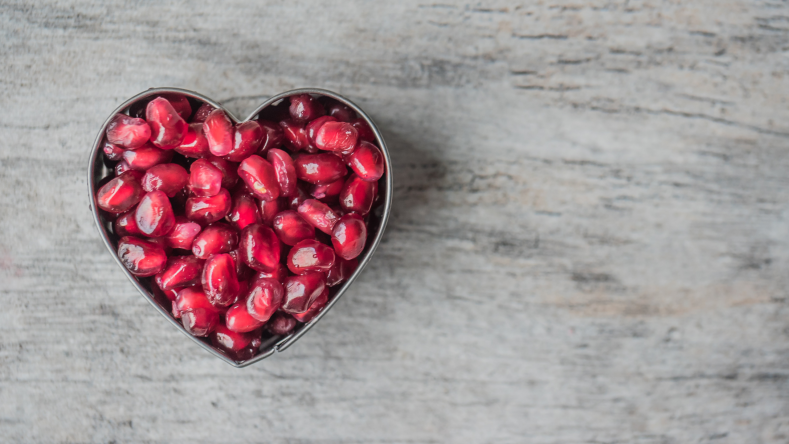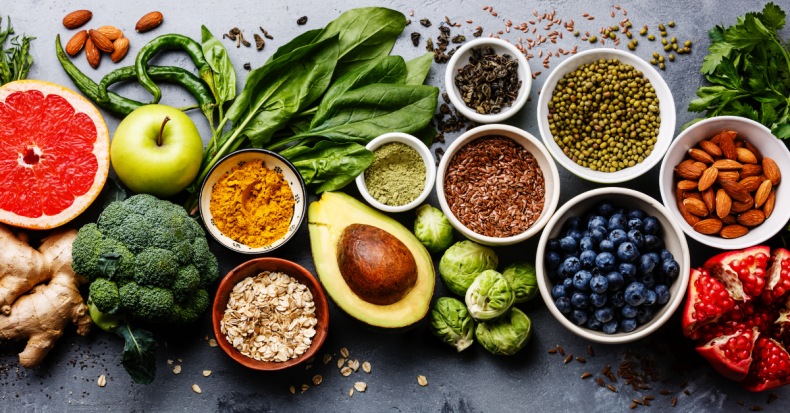Feeding your gut microbiome for weight management
Notable research suggests that the gut microbiome is responsible for reduced inflammation, improved heart health, and glycemic control, but are microbes really the secret to weight loss? We did a deep dive into the latest research to determine how gut health impacts the number on the scale.

Gut health has become an ever-increasing area of interest over the last decade. And for good reason! Studies continue to show that the gut microbiome influences inflammation mental health cardiovascular function immunity glycemic control
Unfortunately, stress levels, lack of sleep, and certain foods can negatively impact the gut microbiome, and lead to adverse health outcomes that may also affect the number on the scale. But before we discuss the gut microbiome’s role in weight management, let’s start off by defining what it is and how it impacts overall health.
What is the gut microbiome?
The gut microbiome refers to all the microbes in your intestines, and consists of 40 trillion bacterial cells and 1,000 different species of bacteria [ 1 2
The majority of these microbes are symbiotic (where both your body and microbiota benefit), but some are pathogenic (disease-promoting). While your body needs both to coexist and keep you healthy, a disturbance in this balance–otherwise known as dysbiosis–can make you more susceptible to chronic disease, inflammation, and even weight gain.
To help maintain a healthy gut balance, studies suggest that taking probiotics (either through food or supplements) can be beneficial, as these living microorganisms may restore the composition of the gut microbiome and prevent gut inflammation [ 30
How does gut microbiome affect health?
Notable research shows that diet and lifestyle choices both play a role in microbial function, so here’s how a balanced gut microbiome can positively affect your health [ 3

Promotes heart health.
Some gut microbes (like those in the Lactobacillus and Bifidobacterium genera) have been shown to improve HDL (“good”) cholesterol triglycerides 4 5 6
Improved immune function.
Gut microbiota help regulate immune homeostasis by communicating with immune cells, maintaining intestinal barrier integrity, preventing the growth of pathogenic organisms, and generating anti-inflammatory short chain fatty acids [ 7

Better brain health.
Studies have shown that certain species of bacteria in the gut help produce some neurotransmitters (such as serotonin) which influence brain functions such as mood [ 8 9 10
Improved gut health.
Certain bacteria (such as Bifidobacteria and Lactobacilli) have been shown to improve gut health, reduce bloating and ease abdominal pain, and alleviate diarrhea [ 13 14 13 14
Reduced inflammation.
Research shows that inflammatory conditions (such as Crohn's disease, ulcerative colitis, multiple sclerosis, and rheumatoid arthritis) are influenced by microbial alterations in the gut and some strains of probiotics may improve symptoms [ 15 16
Correlation between obesity and gut microbiome
A gathering body of research shows that obesity and gut microbiome are closely related, so here are some ways that dysbiosis can impact the number on the scale [ 17 18 19
Glycemic control.
Studies have found that the gut microbiota in obese people is less diverse than that of lean people, which can reduce metabolic energy consumption and lead to sub-optimal glycemic control [ 19 20 11 12 21 22
Appetite regulation.
Studies show that the gut microbiota impacts leptin and ghrelin, two hormones that regulate hunger [ 23 24 25

How to improve gut health for weight loss
Studies continue to show that dysbiosis can contribute to weight gain, so here are some ways to manipulate the gut microbiota to facilitate weight loss [ 26 27
Limit artificial sweeteners and refined sugars.
Artificial sweeteners and refined sugars can increase glucose levels and prompt the growth of unhealthy gut bacteria, which may lead to dysbiosis.
Some evidence has shown that artificial sweeteners–like aspartame–increase blood sugar by stimulating the growth of unhealthy bacteria (such as Enterobacteriaceae)in the gut microbiome [ 28 29
Added sugar intake also provides empty, non-satiating calories and disrupts leptin production, which can increase your desire for food and lead to weight gain [ 31
Take a probiotic supplement.
Probiotics are live microorganisms found in certain foods or supplements that confer a health benefit. Several strains of probiotics in the Lactobacillus and Bifidobacterium family have been shown to reduce weight and belly fat [ 33 32

Try a plant-based diet.
Whether it’s vegetarian, vegan, or flexitarian, plant-based diets have been associated with numerous health benefits, some of which include weight loss and sustainable weight management [ 34
According to one study, those who ate a vegan diet for 16 weeks saw a noticeable decrease in weight as well as an increase in the gut microbiome and overall health compared to those who didn’t go vegan [ 35
In addition to weight loss, studies show that those who eat plant-based diets have increased levels of Bifidobacterium and Lactobacillus, both of which offer anti-inflammatory benefits and cardiovascular protection [ 35
Best foods for gut health
Whether you’re looking to improve your overall health or manage your weight, here are some science-based gut-friendly foods to include in your daily diet.
Eat a diverse range of foods. Studies have found that eating a more diverse range of foods (such as plants, whole grains, and healthy fats) throughout the day can promote the growth of healthy microbes and create a healthy gastrointestinal microbiome [
36
].Focus on fiber. High fiber foods (such as beans, berries, avocados, artichokes, oats, chia seeds, popcorn, and legumes) can promote the growth of Bifidobacteria, a probiotic that has been shown to improve digestive health, break down food, absorb nutrients, and fight off disease-causing organisms[
37
].Enjoy more fermented foods. Fermented foods (like yogurt, kimchi, sauerkraut, miso, kombucha, and kefir) contain healthy bacteria that can help reduce the amount of disease-causing species in the gut [
38
].Dive into prebiotics. Prebiotics are food for good gut bacteria, inducing changes in the composition and/or activity of the microbiome [
39
]. Apples, oats, garlic, asparagus, and bananas are just a few prebiotic foods that can encourage healthy bacteria growth and improve the microbiome.
Summary
Gut health has a large impact on overall health, as it’s intimately related to mental health, cardiovascular function, immunity, glycemic control, appetite regulation, and digestive health. Disturbing the balance of the gut microbiome–otherwise known as dysbiosis–can make you more susceptible to disease and even weight gain.
Multiple studies show that by manipulating the gut microbiota through probiotics, fermented foods, and a diverse diet, you can reduce inflammation, improve glycemic control, facilitate weight loss, or even prevent obesity [ 26 27
Disclaimer: The text, images, videos, and other media on this page are provided for informational purposes only and are not intended to treat, diagnose or replace personalized medical care.
Key takeaways
The gut microbiome refers to all the microbes in your intestines, and consists of 40 trillion bacterial cells and 1,000 different species of bacteria [
1
,2
].A disturbance in the gut microbiome is referred to as dysbiosis, and can make you more susceptible to chronic disease, inflammation, and even weight gain.
A balanced gut microbiome contributes to heart and brain health, reduced inflammation, and a better immune system.
Dysbiosis can wreak havoc on your body and contribute to sub-optimal glycemic control and abnormal appetite levels, both of which can impact weight.
You can improve gut health and facilitate weight loss by limiting artificial sweeteners and refined sugars, taking a probiotic supplement, and eating more plant-based foods.
References
Sender, R., Fuchs, S., & Milo, R. (2016). Revised Estimates for the Number of Human and Bacteria Cells in the Body. PLoS biology, 14(8), e1002533. https://doi.org/10.1371/journal.pbio.1002533
Integrative HMP (iHMP) Research Network Consortium (2014). The Integrative Human Microbiome Project: dynamic analysis of microbiome-host omics profiles during periods of human health and disease. Cell host & microbe, 16(3), 276–289. https://doi.org/10.1016/j.chom.2014.08.014
Conlon, M. A., & Bird, A. R. (2014). The impact of diet and lifestyle on gut microbiota and human health. Nutrients, 7(1), 17–44.
https://doi.org/10.3390/nu7010017
Fu, J., Bonder, M. J., Cenit, M. C., Tigchelaar, E. F., Maatman, A., Dekens, J. A., Brandsma, E., Marczynska, J., Imhann, F., Weersma, R. K., Franke, L., Poon, T. W., Xavier, R. J., Gevers, D., Hofker, M. H., Wijmenga, C., & Zhernakova, A. (2015). The Gut Microbiome Contributes to a Substantial Proportion of the Variation in Blood Lipids. Circulation research, 117(9), 817–824.
https://doi.org/10.1161/CIRCRESAHA.115.306807
Kazemian, N., Mahmoudi, M., Halperin, F., Wu, J. C., & Pakpour, S. (2020). Gut microbiota and cardiovascular disease: Opportunities and challenges. Microbiome, 8(1).
https://doi.org/10.1186/s40168-020-00821-0
Wang, L., Guo, M. J., Gao, Q., Yang, J. F., Yang, L., Pang, X. L., & Jiang, X. J. (2018). The effects of probiotics on total cholesterol: A meta-analysis of randomized controlled trials. Medicine, 97(5), e9679.
https://doi.org/10.1097/MD.0000000000009679
Wu, H. J., & Wu, E. (2012). The role of gut microbiota in immune homeostasis and autoimmunity. Gut microbes, 3(1), 4–14.
https://doi.org/10.4161/gmic.19320
O'Mahony, S. M., Clarke, G., Borre, Y. E., Dinan, T. G., & Cryan, J. F. (2015). Serotonin, tryptophan metabolism and the brain-gut-microbiome axis. Behavioural brain research, 277, 32–48.
https://doi.org/10.1016/j.bbr.2014.07.027
Cryan, J. F., & Dinan, T. G. (2012). Mind-altering microorganisms: the impact of the gut microbiota on brain and behaviour. Nature reviews. Neuroscience, 13(10), 701–712.
https://doi.org/10.1038/nrn3346
Clapp, M., Aurora, N., Herrera, L., Bhatia, M., Wilen, E., & Wakefield, S. (2017). Gut microbiota's effect on mental health: The gut-brain axis. Clinics and practice, 7(4), 987.
https://doi.org/10.4081/cp.2017.987
Li, W. Z., Stirling, K., Yang, J. J., & Zhang, L. (2020). Gut microbiota and diabetes: From correlation to causality and mechanism. World journal of diabetes, 11(7), 293–308.
https://doi.org/10.4239/wjd.v11.i7.293
Rodrigues, R. R., Gurung, M., Li, Z., García-Jaramillo, M., Greer, R., Gaulke, C., Bauchinger, F., You, H., Pederson, J. W., Vasquez-Perez, S., White, K. D., Frink, B., Philmus, B., Jump, D. B., Trinchieri, G., Berry, D., Sharpton, T. J., Dzutsev, A., Morgun, A., & Shulzhenko, N. (2021). Transkingdom interactions between lactobacilli and hepatic mitochondria attenuate western diet-induced diabetes. Nature Communications, 12(1).
https://doi.org/10.1038/s41467-020-20313-x
Glassner, K. L., Abraham, B. P., & Quigley, E. (2020). The microbiome and inflammatory bowel disease. The Journal of allergy and clinical immunology, 145(1), 16–27.
https://doi.org/10.1016/j.jaci.2019.11.003
Bischoff, S. C., Barbara, G., Buurman, W., Ockhuizen, T., Schulzke, J. D., Serino, M., Tilg, H., Watson, A., & Wells, J. M. (2014). Intestinal permeability--a new target for disease prevention and therapy. BMC gastroenterology, 14, 189.
https://doi.org/10.1186/s12876-014-0189-7
Wang, J., Chen, W.-D., & Wang, Y.-D. (2020). The relationship between gut microbiota and inflammatory diseases: The role of macrophages. Frontiers in Microbiology, 11.
https://doi.org/10.3389/fmicb.2020.01065
Clemente, J. C., Manasson, J., & Scher, J. U. (2018). The role of the gut microbiome in systemic inflammatory disease. BMJ.
https://doi.org/10.1136/bmj.j5145
Sun, L., Ma, L., Ma, Y., Zhang, F., Zhao, C., & Nie, Y. (2018). Insights into the role of gut microbiota in obesity: Pathogenesis, Mechanisms, and therapeutic perspectives. Protein & Cell, 9(5), 397–403.
https://doi.org/10.1007/s13238-018-0546-3
Agus A, Clément K, Sokol HGut microbiota-derived metabolites as central regulators in metabolic disordersGut 2021;70:1174-1182.
https://gut.bmj.com/content/70/6/1174
Muscogiuri, G., Cantone, E., Cassarano, S., Tuccinardi, D., Barrea, L., Savastano, S., & Colao, A. (2019). Gut microbiota: A new path to treat obesity. International Journal of Obesity Supplements, 9(1), 10–19.
https://doi.org/10.1038/s41367-019-0011-7
Bae, J. P., Lage, M. J., Mo, D., Nelson, D. R., & Hoogwerf, B. J. (2016). Obesity and glycemic control in patients with diabetes mellitus: Analysis of physician electronic health records in the US from 2009-2011. Journal of diabetes and its complications, 30(2), 212–220.
https://doi.org/10.1016/j.jdiacomp.2015.11.016
Gérard, C., & Vidal, H. (2019). Impact of Gut Microbiota on Host Glycemic Control. Frontiers in endocrinology, 10, 29.
https://doi.org/10.3389/fendo.2019.00029
Basak, S., Banerjee, A., Pathak, S., & Duttaroy, A. K. (2022). Dietary fats and the gut microbiota: Their impacts on lipid-induced metabolic syndrome. Journal of Functional Foods, 91, 105026.
https://doi.org/10.1016/j.jff.2022.105026
Han, H., Yi, B., Zhong, R., Wang, M., Zhang, S., Ma, J., Yin, Y., Yin, J., Chen, L., & Zhang, H. (2021). From gut microbiota to host appetite: Gut microbiota-derived metabolites as key regulators. Microbiome, 9(1).
https://doi.org/10.1186/s40168-021-01093-y
Fetissov S. O. (2017). Role of the gut microbiota in host appetite control: bacterial growth to animal feeding behaviour. Nature reviews. Endocrinology, 13(1), 11–25.
https://doi.org/10.1038/nrendo.2016.150
Cani, P. D., Lecourt, E., Dewulf, E. M., Sohet, F. M., Pachikian, B. D., Naslain, D., De Backer, F., Neyrinck, A. M., & Delzenne, N. M. (2009). Gut microbiota fermentation of prebiotics increases satietogenic and incretin gut peptide production with consequences for appetite sensation and glucose response after a meal. The American journal of clinical nutrition, 90(5), 1236–1243.
https://doi.org/10.3945/ajcn.2009.28095
Patterson, E., Ryan, P. M., Cryan, J. F., Dinan, T. G., Ross, R. P., Fitzgerald, G. F., & Stanton, C. (2016). Gut microbiota, obesity and diabetes. Postgraduate medical journal, 92(1087), 286–300.
https://doi.org/10.1136/postgradmedj-2015-133285
Davis C. D. (2016). The Gut Microbiome and Its Role in Obesity. Nutrition today, 51(4), 167–174.
https://doi.org/10.1097/NT.0000000000000167
Palmnäs, M. S., Cowan, T. E., Bomhof, M. R., Su, J., Reimer, R. A., Vogel, H. J., Hittel, D. S., & Shearer, J. (2014). Low-dose aspartame consumption differentially affects gut microbiota-host metabolic interactions in the diet-induced obese rat. PloS one, 9(10), e109841.
https://doi.org/10.1371/journal.pone.0109841
Satokari R. (2020). High Intake of Sugar and the Balance between Pro- and Anti-Inflammatory Gut Bacteria. Nutrients, 12(5), 1348.
https://doi.org/10.3390/nu12051348
Hemarajata, P., & Versalovic, J. (2013). Effects of probiotics on gut microbiota: mechanisms of intestinal immunomodulation and neuromodulation. Therapeutic advances in gastroenterology, 6(1), 39–51.
https://doi.org/10.1177/1756283X12459294
Luo, S., Monterosso, J. R., Sarpelleh, K., & Page, K. A. (2015). Differential effects of fructose versus glucose on brain and appetitive responses to food cues and decisions for food rewards. Proceedings of the National Academy of Sciences, 112(20), 6509–6514.
https://doi.org/10.1073/pnas.1503358112
John, G. K., Wang, L., Nanavati, J., Twose, C., Singh, R., & Mullin, G. (2018). Dietary Alteration of the Gut Microbiome and Its Impact on Weight and Fat Mass: A Systematic Review and Meta-Analysis. Genes, 9(3), 167.
https://doi.org/10.3390/genes9030167
Gomes, A. C., de Sousa, R. G., Botelho, P. B., Gomes, T. L., Prada, P. O., & Mota, J. F. (2017). The additional effects of a probiotic mix on abdominal adiposity and antioxidant Status: A double-blind, randomized trial. Obesity (Silver Spring, Md.), 25(1), 30–38.
https://doi.org/10.1002/oby.21671
Hever, J. (2016). Plant-based diets: A physician’s guide. The Permanente Journal.
https://doi.org/10.7812/tpp/15-082
Tomova, A., Bukovsky, I., Rembert, E., Yonas, W., Alwarith, J., Barnard, N. D., & Kahleova, H. (2019). The Effects of Vegetarian and Vegan Diets on Gut Microbiota. Frontiers in nutrition, 6, 47.
https://doi.org/10.3389/fnut.2019.00047
Heiman, M. L., & Greenway, F. L. (2016). A healthy gastrointestinal microbiome is dependent on dietary diversity. Molecular Metabolism, 5(5), 317–320.
https://doi.org/10.1016/j.molmet.2016.02.005
Klinder, A., Shen, Q., Heppel, S., Lovegrove, J. A., Rowland, I., & Tuohy, K. M. (2016). Impact of increasing fruit and vegetables and flavonoid intake on the human gut microbiota. Food & Function, 7(4), 1788–1796.
https://doi.org/10.1039/c5fo01096a
Alvaro, E., Andrieux, C., Rochet, V., Rigottier-Gois, L., Lepercq, P., Sutren, M., Galan, P., Duval, Y., Juste, C., & Doré, J. (2007). Composition and metabolism of the intestinal microbiota in consumers and non-consumers of yogurt. The British journal of nutrition, 97(1), 126–133.
https://doi.org/10.1017/S0007114507243065
Markowiak, P., & Śliżewska, K. (2017). Effects of Probiotics, Prebiotics, and Synbiotics on Human Health. Nutrients, 9(9), 1021.
https://doi.org/10.3390/nu9091021




